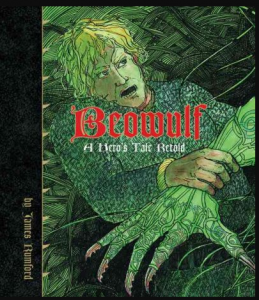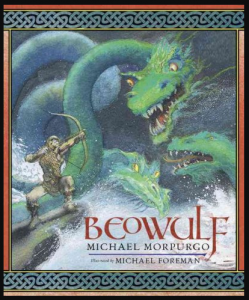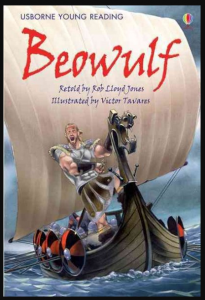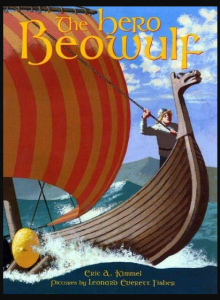Learn about a famous Anglo-Saxon hero: Beowulf
Before we begin, watch this short clip about the Anglo-Saxons: HERE
(Clicking on the links on this page will take you away from Ms. Rosen Reads. Ms. Rosen is not responsible for the content on other sites.)
Goals:
Participation: silently view the most famous story from Anglo-Saxon times.
Knowledge: know the basic plot and style of writing of Beowulf.
Attitude: show an in interest in how stories portray great themes of humanity.
Skills: be able to listen to a long story
Watch the story:
What did you especially notice in this story?
Complete the following summary:
Beowulf is the first great work of _________ in the __________ language. It was an e________ poem and used a lot of a_________ . Scholars believe it was written in the _______ .
In the epic, a long story about a hero, Beowulf travels from E______ to D_______ to help a king. That king had saved the life of Beowulf’s father long ago, and Beowulf wanted to repay the favour, so he came and killed G________ , a monster that was taking everyone’s h__________ away and killing people. Beowulf also killed G______’s mother and then sailed back to E___________ .
Many years later, fifty years later, a th_________ steals ________ from a d__________ . Once again, Beowulf saves people, his own people. He kills the ___________ but dies.
The Anglo-Saxons admired s_________ , c__________ , l___________ and g_______ . Beowulf portrayed all these qualities in this great story still remembered today.
Evaluation: accurate in answers, spelling and punctuation; neat and attractive.
Observations from students who have watched this story:
– there was always someone who doubted the hero
– the first king did not sit on his throne when under seige from Grendel
– three monsters
– Beowulf was humble.
– good versus evil
– the king was kind and gave his people nice things
– even though Grendel’s mother was a monster, she still grieved over her son
– the necklace was passed on from person to person
– in many stories of dragons, all the dragons crave gold
– Beowulf lived much longer after the first two battles with Grendel and his mother
– the dead people floated down the river – when battling, the fire didn’t hit the gold
– Beowulf didn’t take his sword into battle with Grendel
– Beowulf went under water for more than a day against Grendel’s mother
– the land of the Danish is now called Denmark
– the colour of the blood varied: red versus black: mother versus Grendel
– the people didn’t want to believe the monster was a demon
– Grendel walked right back the first guy and went to the people who didn’t believe in him
– Grendel feasts on happiness
– Beowulf was trying to defeat Grendel’s mother, he took a sword
– when Beowulf was fighting the dragon, he was hallucinating that the dragon was himself
– Grendel’s mother kept coming back to fight again, she kept reappearing
– when the fisherman came, he was the first one to deny that the monster was a demon but he slowly gained respect for Beowulf
– there could be allusions to Christian stories such as the Passover
– when the man was drunk, Beowulf offered him more ale
– when Beowulf fought Grendel, he tore off his arm and hung it
– the monsters formed from Beowulf’s shadows
– Beowulf hung up the monsters and then they disappeared
– you shouldn’t ignore your problems; face them if you want happiness
– Grendel’s mother took his body and kept it with her…
– wine spilled on the ground like blood
– Grendel and his mother could possibly not exist
– The point of stories is to help us deal with our own psychological battles in life.
– only one soldier helped Beowulf
– the dragon was voracious: it wanted all the gold
– most of the soldiers ran off except one – Grendel was full of hatred = black
– mother was full of love for her son = red
– the dragon and it’s gold is like in the Hobbit movie
– every time when one of the monster died, it turned into dust and disappeared
– a necklace kept being passed along
– the monsters only came where there were feasts
– when Beowulf died, he wasn’t sad; he honoured death
– he would rather die in battle than live in shame
– Beowulf always kept a body piece to show the others that he had killed
– he was quite humble
– when he dove into the hole, he had to hold his breath for a day and later he climbed out: a myth
– Titanic and Journey to the Centre of the Earth are similar: diving into the depths
– everyone who ate with the king had long hair
– when the mother knocked him down, there was a sword… fantastical world of myth
– always slept on the floor - Beowulf was very brave – he kind of looked like Thor – had a lot of alcohol
– Beowulf’s king didn’t want him to go but was proud of him
– the story is similar to Percy Jackson: he had to go into an underworld to get a pearl
– there weren’t many women
– at the end, all of the soldiers except one were cowards and ran
– they never trusted the peasant when he was scared
– only one person helped; the others ran
– at the first, there was a man who called Beowulf a traitor
– Beowulf wasn’t burned by the dragon three times until the very end, the fourth time
– Beowulf cut of the mother’s hands and she grew back
– Beowulf passes on the crown the brave soldier
– people had long hair like the Franks
– Grendel comes when there is happiness and joy among the people
– when the one man stayed to help, in the Bible only one man thanks Jesus and the rest leave
– Beowulf went on 3 missions
– after Beowulf dies, people build a mountain of rocks, a monument
– the setting was dark when there was a monster
– at the beginning, he didn’t want to use weapons
– on the sacred necklace, there were three medallions
– the hands and heads disappeared after being killed
– the thief fled from the banquet, stole from the dragon, the dragon awoke and came to destroy: greed




